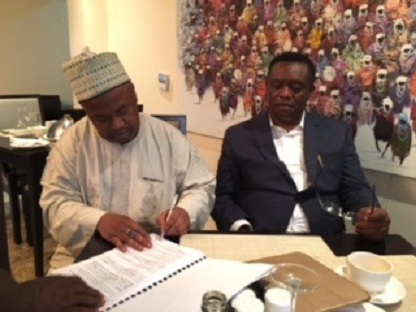Why Nigeria’s power system keeps crashing

… PG now below 4000MW
Nigeria has continued to experience dwindling power generation as data gathered by Business Times shows that the country’s power capacity is now below 4000 megawatts.
On Monday 13th March, 2017, Nigeria’s power generation was 3,483.15 Megawatts.
On 14th March, 2017, power generation stood at 3,459 .00 Megawatts.
15th March, saw power generation at 3, 558.86 Megawatts , while on the 16th March , power generation pegged at 3 002 .98 Megawatts.
On 17th March, the country had 3, 558.86 Megawatts, while on 18th March , it had 3, 672 .20 Megawatts.
19th March , Nigeria saw its PG drop to 3 ,641 Megawatts, further crashing on the 20th March to 3 , 603 .82 Megawatts. On the 21st March , 2017 , Power Generated was 2,871 .08 Megawatts, 27th March, 3,497.00 Megawatts, and on the 28th March , Power Generated plunged further to 3,412 .00 Megawatts.
The unstable generation did not stop there, on 29th March, it again fell to 3,379 .00 Megawatts.
The continuous crash in the country’s power generation capacity has been linked to various reasons in recent years.
The very popular one has been lack of gas supply to generation companies. Worsening the gas issue is the militancy in the Niger Delta.
Another reason for the drop is shortage of water supply to the hydrogen generating plants which has further reduced power generation.
The most recent reason for the drop is the high exchange rate, as most of the equipment and materials used in generation are being exported from outside the country.
On the 30th March , 2017 , Power Generated further dropped to 3,130 .31 Megawatts, while on the 31st March , it rose a bit to 3,571.42 Megawatts.
For the 1st April , 2017, total generated by Nigeria was 3,417 .78 Megawatts, while on the 2nd April , 2017, generation was 3,235 .22 Megawatts.
Data for 3rd of March had not filed in as at the time of writing this report.
Recently, strong indications emerged after the management of one of Nigeria’s electricity generation companies, Egbin Power threatened to shut down operations due to non-settlement of N100billion debt, inadequate gas supply and inefficiency in operations of the Transmission Company of Nigeria (TCN).
Speaking to Daily Times, Dallas Peavey, the Managing Director, Egbin Power Plc on Wednesday, said that the country is heading towards another blackout by next week as liquidity, transmission and gas supply issues threatened its operations.
Peavey made the disclosure during against the backdrop of dropped in generation.
Peavey said that the plant was being forced to gradually shutdown due to adverse effect of grid instability that endangers its turbines.
He said that another challenges was the inadequate gas supply to generate at optimal capacity as well as the huge debts owed the company by federal government owned Nigerian Bulk Electricity Traders (NBET) and Market Operator.
According to him, Nigeria’s electricity supply may get worse in the coming weeks as liquidity, transmission and gas supply issues are threatening the operation of its biggest power station, Egbin.
“Egbin power plant is one of the biggest single power generating stations in Africa, with an installed capacity of 1320 MW consisting of 6 units of 220MW each.
“Following the conclusion of the government’s privatization exercise in November 2013, the consortium formed by the partnership between New Electricity Distribution Company and the Korean Electric Power Corporation (NEDC/KEPCO) acquired Egbin Power plc, ‘’ he said .
The Egbin boss said that the effect of the debt has become worse for the company owing to the fact that it is owed N110billion.
In his words, “we owe the gas companies and have others like our technical partners (KEPCO) to pay, and importantly our lenders, the banks.
“We have made massive investments in making the plant readily available to generate electricity sustainably but unfortunately, we can’t break even due to the gross inefficiency in the value chain.
“The government guarantees to pay us for every megawatt we generate and sell to NBET but they have not done that.
“We just got paid for the month of December, 2016, three months later and we were only paid a paltry 28 percent out of the total 100 per cent of the verified and accepted invoice for that month.
“That is how the outstanding debts kept accumulating for three and half years now. Asked what will be the effect, if the debt is not paid,’’he said.
He said that eventually these unbearable business operating circumstances and conditions will shut us down any moment if it persists.
“That is the simple but bitter truth”, he said.
On transmission, Peavey, said the company had reached 1,100 MW while the installed capacity is 1, 320 MW, adding that the grid could not take the power because of the capability issues within the Transmission Company of Nigeria system.
“ We are constrained and limited to generate about 350MW daily due to both TCN system operations and inadequate gas supply issues.
`So, 70 percent of our output is lost because available power can’t be evacuated. When you get good news from TCN that you can increase your generation, we will be faced with not “enough gas” and when there is gas, you have TCN issues. So, you have one, you don’t have the other.
“Let me be honest, if Egbin fails, it’s going to be dark as Egbin provides close to 30 per cent of Nigeria’s power, so let the required intervention be completed and urgently too, however, the Egbin turbines are ready to light up Nigeria,” he said.






